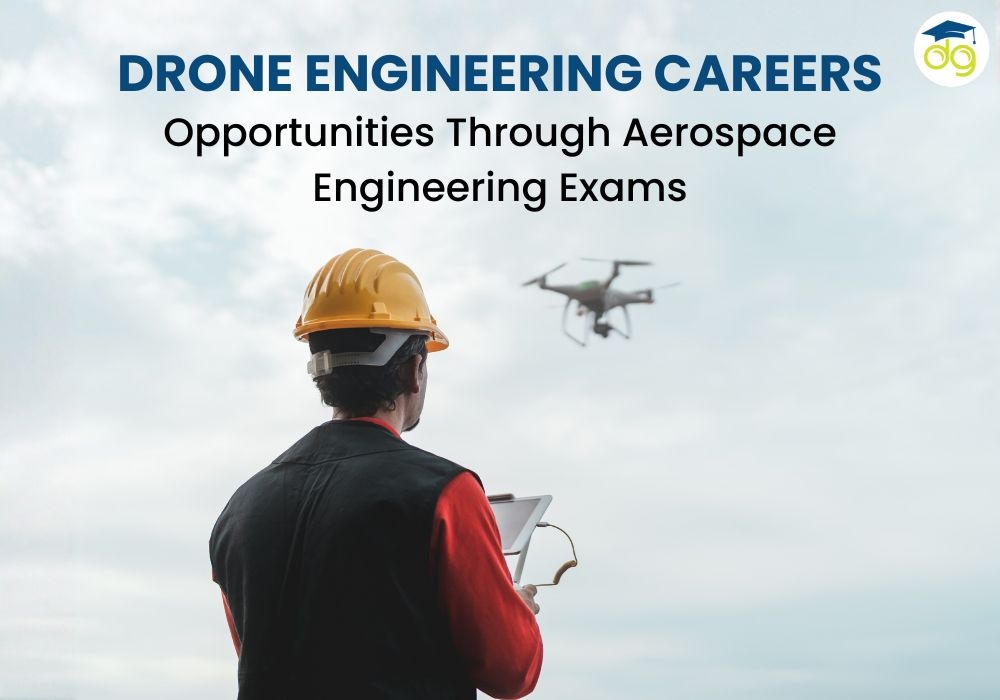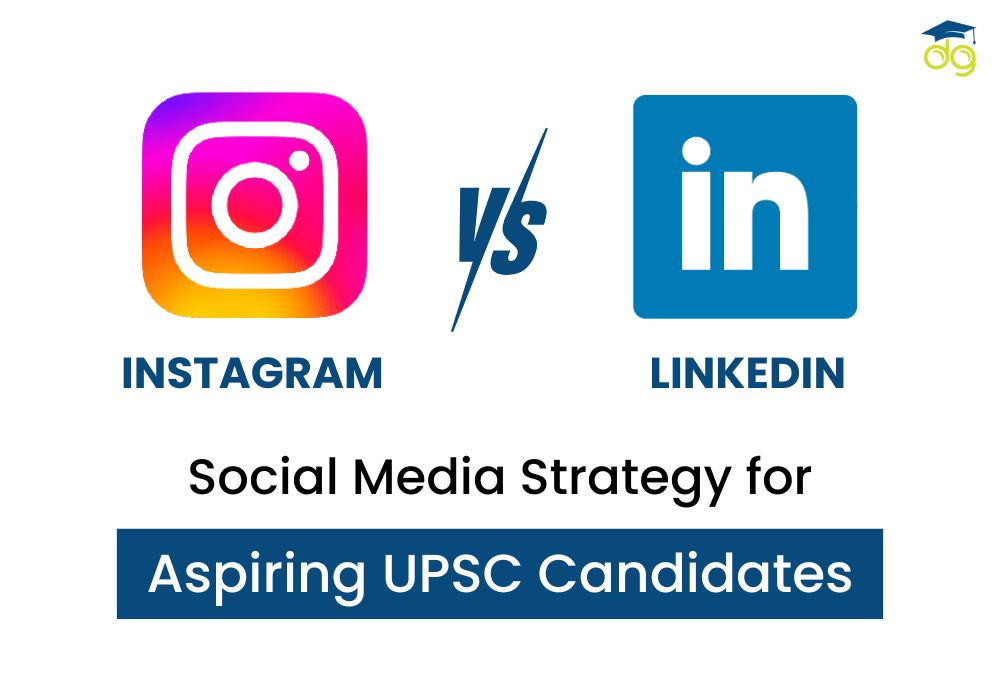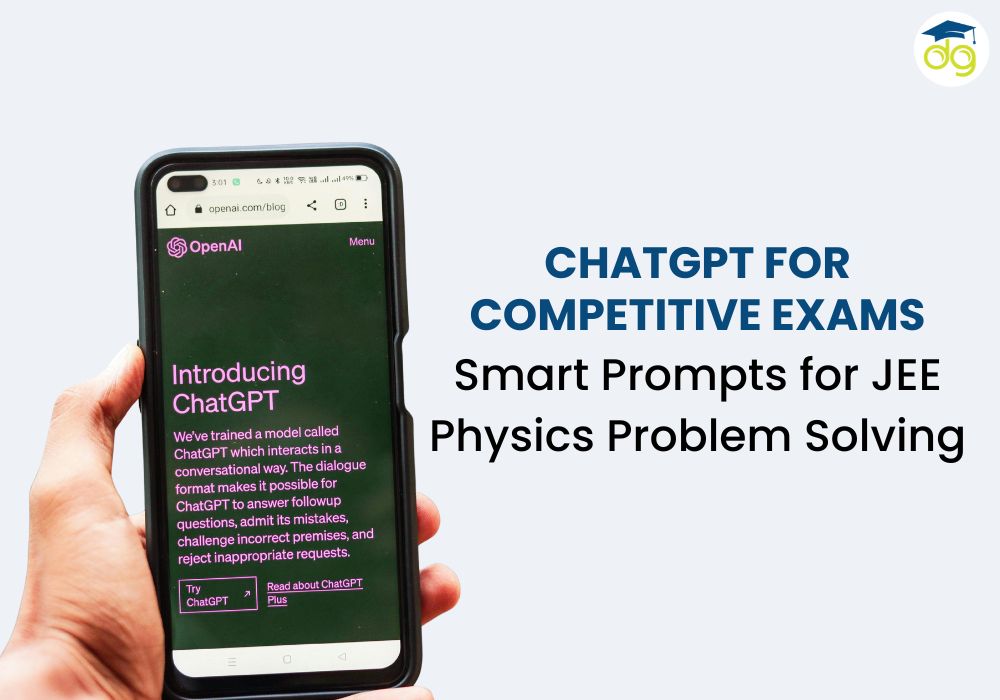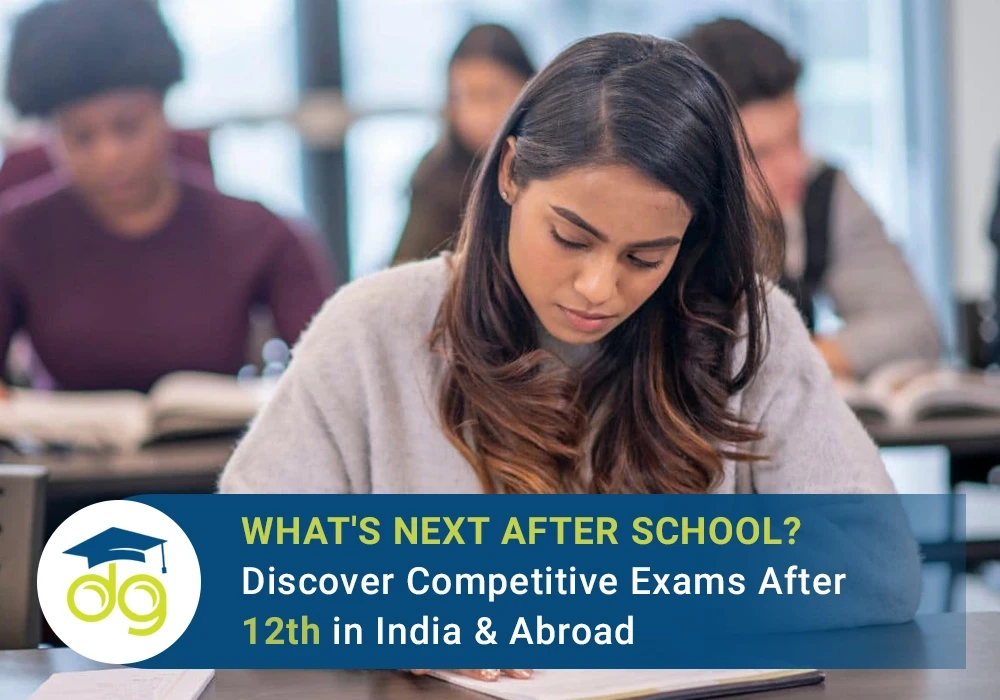What's Next After School? Discover Competitive Exams After 12th in India
Your Guide to Navigating Competitive Exams After 12th for Career Success
Choose your path wisely once you are done with the 12th grade as it may determine the future course of your career. Among these options, Indian competitive exams and foreign ones which are taken after grade 12 are the most popular ways leading to the best colleges and universities in different areas of study. With the NEET, JEE Main, JEE Advanced, and CLAT exams, you have a chance to study engineering and pursue medicine, law, and design among other fields at a higher level.
Carefully researching to choose which exams will put you on the right path professionally, and will lead you to a successful career in very competitive environments is a must. When you explore the competitive exams list, you'll find a spectrum of different exams like National Level exams that are NEET for medical students and JEE for engineering aspirants; or stream-specific exams which are Science, Commerce, and Arts. The landscape of competitive exams post-12th is illustrated in this article.
It incorporates key elements like NEET eligibility, JEE preparation, law entrances like CLAT, and the NIFT Entrance Test for fashion and design. Whether you are learning how to tackle common entrance tests or developing your tactic for specific exams, the main goal of this article is to help you choose wisely by providing you with important information you need for your admission to higher education.
Engineering Entrance Exams
Engineering entrance exams play a pivotal role in the lives of students seeking a career in engineering by connecting them to some of India and the world’s reputed engineering programs. Here's a detailed look at some of the key exams:Here's a detailed look at some of the key exams:
Joint Entrance Exam (JEE)
JEE Main: Each year, NTA, the National Testing Agency, serves as the examination body for JEE (Main), a compulsory test for entry admission to 31 National Institutes of Technology (NITs), 25 Indian Institutes of Information Technology (IIITs), and 28 Government Funded Technical Institutes (GFTIs). In this exam, students' knowledge of physics, chemistry, and mathematics is assessed, concentrating more on application and problem-solving.
BITSAT
Conducted by the Birla Institute of Technology and Science (BITS), BITSAT is an entrance test for admission to the Integrated First Degree courses offered by BITS campuses in Pilani, Goa, and Hyderabad. The exam has the format which comprises the sections such as Physics, Chemistry, English Proficiency, Logical Reasoning, and Mathematics.
State-Specific and Other National Exams
- VITEEE: A test which is carried out by VIT University for students applying for admission into its four campuses. The exam consists of academic fields and judges whether all the knowledge is there.
- SRMJEEE: Conducted by SRM Institute of Science and Technology for multiple campuses, this entrance exam is of paramount importance to get enrolled into different engineering programs.
- COMEDK UGET: This exam is conducted all around the 181 engineering institutes affiliated with the Consortium of Medical, Engineering, and Dental Colleges of Karnataka.
Exam Patterns and Schedules
- JEE Main: The examination will take place in two sessions every year, with the dates of the next session being January 24 to February 1, and April 4 to 12, 2024. The registration of the second session will be closed on 4 April 2024.
- JEE Advanced: Scheduled for May 26, 2024, registrations will also open on April 27, 2024.
- BITSAT: Provides two sessions, the first from May 20–24 of 2024, and the second from June 22–26, 2024. April 16, 2024, is the application deadline.
Preparation Tips
On-point preparation is the key to doing well in competitive exams. The students who want to succeed in these exams must practice well the previous exam papers and try mock tests that are available on BITSAT, JEE, and VITEEE exams. This tactical anticipation assists in time and accuracy of problem-solving which is vital for the academic performance of students.
Medical Entrance Exams
NEET Overview
NEET( National Eligibility cum Entrance Test) acts as the primary entrance test for candidates desirous of studying MBBS( Medicine) and BDS (Dental Surgery) courses in India. This written-down exam done by NTA that involves 180 multiple-choice questions from physics, chemistry, and biology is called the Joint Entrance Exam (JEE). The duration of the exam which is 3 hours and 20 minutes will test the students on how well they can show their grasp of background knowledge and problem-solving in the set subjects.
Advanced Medical Entrance Exams
For those who desire to enter the postgraduates in medical education, NEET PG and NEET MDS-like exams are paramount. NEET PG considers admission in the MD, MS, PD, and DNB CET programs, whereas NEET MDS is solely applicable to the candidates interested in Master of Dental Surgery. The two of them are under the National Board of Examinations or NBE.
Specialized Medical and Allied Sciences Tests
Beyond the general medical entrance tests, there are specialized exams for specific fields:
- INI CET: Led by AIIMS New Delhi, this test is for PG medical PG medical for MD, MS, MDS, MCh, and DM across coveted institutions such as AIIMS, JIPMER, PGIMER, and NIMHANS.
- AIIMS Nursing: AIIMS is the place where dreams come true for nursing aspirants as the institute conducts entrance examinations for B. Sc (H) and post-basic courses as well.
- All India AYUSH Post Graduate Entrance Test (AIAPGET): This eligibility test is an indispensable requirement for those interested in various postgraduate courses of Indian medicine streams such as Ayurveda, Unani, Siddha and Homeopathy, conducted every year by NTA.
Veterinary Science Entrance Exam
If you hold an ambition of pursuing veterinary science, the UP Veterinary Entrance Exam administered by Deen Dayal Upadhyaya Veterinary Science University and Cattle Research Institute (DUVASU) is your ticket to acquire your Bachelor of Veterinary Science & Animal Husbandry (B. V. Sc & A. H. as one of the core courses.
Key Exam Details and Preparation Tips
- NEET PG 2024: The paper is conducted within a time frame of 3 hours and 30 minutes, including 200 questions which are negatively marked if some wrong answers are written, furthermore, thorough preparation is essential for this exam.
- Preparation: Candidates are advised to key in on getting well with the preparation of the syllabus, frequent application of previous papers, and participation in trial tests so that they can better their accuracy and time management capabilities. This demanding preparation is indispensable for success in such competitive written tests.
Pure Science and Research Exams
|
Institution |
Program |
Entrance Exam |
Key Feature |
|
Indian Institute of Science (IISc) |
4-year BS in Pure Sciences |
JEE Advanced |
Offers a comprehensive foundation in various pure science disciplines |
|
Indian Institutes of Technology (IITs) |
5-year Integrated M.Sc. in Biological Sciences |
JEE Advanced |
Combines rigorous science education with research opportunities |
|
Birla Institute of Technology and Science (BITS) |
5-year M.Sc.(Hons.) in Biological Sciences |
BITSAT |
Focuses on in-depth scientific knowledge and practical skills |
|
Chennai Mathematical Institute (CMI) |
4-year B.S. in Mathematics and Physics |
JEE Advanced or CMI's own entrance exam |
Specialises in mathematical theories and applications |
|
Indian Statistical Institute (ISI) |
4-year B.S. in Pure Sciences |
JEE Advanced or ISI's own entrance exam |
Emphasises statistical methods and their applications in scientific domains |
|
National Institute of Science Education and Research (NISER) |
5-year Integrated M.Sc. in Pure Sciences |
JEE Advanced or NEST |
Dedicated to promoting high-quality scientific research and education |
|
University of Mumbai's Department of Atomic Energy Centre for Excellence in Basic Sciences (UM-DAE CBS) |
Various Pure Sciences courses |
JEE Advanced or NEST |
Integrates core science education with innovative research |
|
Indian Institutes of Science Education and Research (IISERs) |
5-year Integrated M.Sc. in Pure Sciences |
JEE Advanced or IISER Aptitude Test |
Balances course work with research projects to foster a deep understanding of sciences |
|
National Entrance Screening Test (NEST) |
Admission to NISER and UM-DAE CBS |
5-year Integrated M.Sc. in Biological, Chemical, Mathematical, and Physical Sciences |
Focuses on nurturing scientific talent with an emphasis on hands-on research |
|
IISER Aptitude Test (IAT) |
Admission to IISERs |
BS-MS Degree Programme |
Tests aptitude for scientific inquiry and reasoning |
|
Manav Rachna Educational Institutions (MREI) |
Various programs across different universities |
Specific to each program and university |
Offers specialised courses tailored to diverse scientific interests |
Defence and Marine Exams
National Defence Academy (NDA)
Being passed the NDA examination is a crucial stepping stone for those who seek to become officers in the Indian Armed Forces. Performed by the behest of the Union Public Service Commission (UPSC), it is Arranged twice in the year as NDA 1 and NDA 2. Applicants should be 12th pass with the subject of Physics and Mathematics as compulsory at the 10+2 level or hold an already Bachelor’s Degree in the subject of Engineering for the Air Force Academy.
Only unmarried men are eligible to apply and only women can participate as spectators.
Combined Defence Services (CDS)
The CDS examination, managed also by the UPSC, takes place twice a year and it is comprised of a written exam, interview, and personality test. One must be a graduate and an aspiring candidate for the Indian Military Academy, Indian Naval Academy, and Air Force Academy, to be eligible. Through this rigorous selection process, it is guaranteed that only individuals who belong to the elite group of highly qualified individuals are admitted.
Air Force Common Admission Test (AFCAT)
AFCAT is organized twice a year by the Indian Air Force. The candidates can choose between the flying branch, the technical branch, or the ground duty branch. The qualification requirements are different for each exam and hence are tailored to suit various positions in the Air Force.
Indian Coast Guard (ICG)
The IGC examination is held every year and is vital for those who want to enlist in the Indian Coast Guard. Recruitment is performed based on a merit list, where the candidates undergo tough exams to qualify for the various national-level ranks.
Indian Navy Entrance Test (INET)
INET conducts the national-level entrance exam for different entry and senior positions in the Indian Navy. Examinees must pass the examination and meet all the eligibility requirements to be selected.
Indian Navy B.Tech Entry Scheme and Sailors Recruitment
The Indian Navy has some specific programs like the B. Tech Entry Scheme or the Sailors Recruitment. The B. Tech Entry Scheme is for those who have passed their Class 12 and the applications will be online. The Sailors Recruitment encompasses a 24-week basic training at INS Chilka, professional training with a minimum requirement of Class 12 in subjects like Maths, Physics/Chemistry/Biology/Computer Science. Online and postal applications are possible.
Indian Army Technical Entry Scheme (TES)
The TES selected from among the pass-out students of a PCM background of 12th class, 5 years of training from 1st year at OTA Gaya and the rest 4 years at CTWS are imparted. Candidates will be selected depending on their TES final round scores. They will need to send their applications online too.
Fashion and Design Entrance Exams
Overview of Fashion and Design Entrance Exams
Fashion and design exams are crucial to the entry into design schools that the students who seek knowledge and careers in this colorful world of fashion apply to. Prominent tests are the NIFT placement, NID design ability test, and the All India Entrance Examination for Design (AIEED).
NID DAT
- Focus: Tests of imagination and creativity vital career qualities are for a design career.
- Eligibility: 50% or above marks in 12th grade from a recognized exam body; age limit 17-23 years, with a relaxation of 5 years for SC/ST/PwD category.
- Skills Tested: Up-to-date knowledge of fashion trends, the ability to visualize and create new designs, a mastery of drawing skills, and the know-how of how to put together different colors and patterns.
NIFT Entrance Test
- Focus: The test is based on the parameters of evaluating a student's design and creativity skills along with quantitative skills where the fashion field has been included.
- Preparation: Generally, the schools do entrance exams, which focus on how flexible the students are capable of thinking and handling multiple textile patterning as opposed to the overall accomplishment.
University-Specific Admission Tests
- Exams Included: NIFT Exam, UCEED Exam, NID DAT Exam, Pearl Academy Exam, CEED Exam, SEED Exam and FDDI Exam.
- Courses Offered: BA Fashion Design, BA Design.
Career Prospects and Industry Insights
- Opportunities: The competent graduates can focus on the diversified nature of the fashion industry where they can get employed in leading fashion houses around the globe.
- Salary Expectations: The starting salary of a fashion designer is around 4 lakh rupees per year with experience being the deciding factor towards raising the salary amount.
- Industry Growth: Apparel business development opens good chances, especially for the Asian countries which are primary producers of apparel.
Additional Courses and Specializations
- Courses Available: Diploma and certification courses will be available in Interior Design, 3D Animation & Visual Effects, Fashion Design, Jewellery Design, Event Management, and so on.
- Specializations: Nutrition & Dietetics, Music Production, Hospitals & Healthcare Management, Photography, Journalism, Advertising PR & Corporate Communication, Screenwriting, RJ (Radio Jockey), DJing, Ad Film Making, Fashion Styling.
- In this section, you will get a full overview of the fashion and design industry entrance exams and opportunities that will enable you to choose prudently the best way to enter into this particular field.
Humanity and Social Sciences Exams
Although focusing on different aspects of historical, literary, artistic, and philosophic humanity, Humanities and Social Sciences exams are designed to shape the knowledge and skills of future government employees, offering a range of career paths in areas of history, literature, art, and philosophy.
It can either be a gateway to the profound understanding of humanities and social sciences and at the same time offer significant career prospects or it can be what’s needed for further study in other specialized fields like law or design.
Government Exams in Humanities and Social Sciences
Humanity and Social Sciences exams include various government exams such as:
- SSC CHSL, UDC, LDC
- Postal Assistant, DEO, SA
- SSC MTS, SSC GD Exam
- SSC Stenographer
- RRB Assistant Loco Pilot
- Railway Group D
- Various exams for the Indian Army, Navy, and Security Forces
Advantages of Pursuing Humanities Exams After 12th
- Career Opportunities: Artists and humanities majors get ample placements since the economy has a high demand for these skills.
- Eligibility for Diverse Fields: The students can qualify to undertake further studies in law, art, and hotel management, hence, giving them a variety of career options.
- Enhanced Understanding Abilities: The strict curriculum of humanities exams develops critical thinking and comprehension skills, these skills are advantageous for the candidates of any competitive examinations.
Popular Bachelor Courses in Humanities
- Bachelor of Arts in Political Science
- Bachelor of Arts in Sociology
- Bachelor of Arts in Geography
- Bachelor of Arts in History
- B.A. (Hons.) Journalism and Mass Communication Bachelor of Arts in Liberal Arts Bachelor of Arts in Psychology
- Bachelor of Arts in Social Work Bachelor of Arts in Philosophy B.A.- Journalism and Mass Communication (BJMC)
Key Entrance Exams for Humanities and Social Sciences
- HSEE (Integrated M. A in Development and English): A 5-year course and examination of 180 minutes duration which includes 129-145 questions from three sections like English and Comprehension Skill, Analytical & Quantitative Ability and General Studies TISS BAT/ CUET (B. A in Social Science): A 3-year course with a 60-minute exam including 60 verbal ability, mathematics, and logical reasoning questions and general awareness from February 13 to March 14, 2024.
- SAT India 2024: The Scholastic Assessment Test is scheduled for May 4, 2024, and the registration will end on May 16, 2024.
- CUET 2024: The CUET is predicted to be held around April 2024 to May.
- JMI Entrance Exam 2024: The entrance exam of Jamia Millia Islamia is scheduled on April 24, 2024.
This detailed overview of the Humanities and Social Sciences exams after 12th gives students a clear route into the exploration of human culture, social fabric, and political systems, thereby lending them with the understanding and skill-set necessary for a career in any given field.
Agriculture, Management, and Hotel Management Exams
ICAR AIEEA-UG-PG and State-Based Exams
If there is a student who has an agricultural interest, the ICAR AIEEA-UG-PG exams are something he needs to pass to get into undergraduate and postgraduate programs in agricultural universities within India. Besides, the multiple State entrance tests like KCET, KEAM, and TS EAMCET also play a key role in admission to agriculture and allied courses.
NCHMCT JEE
The NCHMCT JEE, popularly known as the National Council of Hotel Management and Catering Technology Joint Entrance Examination, is a significant exam that is taken by those who want to pursue a career in the hospitality sector. The online test is 3 hours long and consists of 200 questions from the 5 sections which include Numerical Ability, Analytical Aptitude, Reasoning, General Knowledge, and the English language. points awarded is 4 for each right answer and 1 mark would be deducted for each wrong answer.
Candidates must have passed their twelfth standard with English as a compulsory subject and should not be more than 25 years (28 years for SC/ST) dated the 1st of July, 2022.
AIMA UGAT
Being an online exam the AIMA UGAT main exam is held for 3 hours. It comprises 180 questions divided into six sections: General Sciences, Engineering, Reasoning and Intuition, Mathematics and Data Interpretation, and English Language. This test is positive, and there are no deductions for erroneous answers.
The eligibility criteria are a minimum of 50% score in the 11th exam and a candidate must be at least 17 years old.
MAH HM CET
The Maharashtra Hotel Management Common Entrance Test (MAH HM CET) offers two different exams: MAH B-HMCT CET for Bachelor's and MAH MHMCT CET for Master's degrees in Hotel Management. The BHMCT CET is a 1.5-hour online exam with 100 questions, and for 1 hour the MHMCT CET has 50 questions.
The test design includes hospitality-specific areas for each exam, along with marking that gives out points for correct answers and subtracts points for incorrect ones. You need at least 45% marks in your 12th exam (40% for SC/ST) if you want to attend the BHMCT CET and at least 50% marks if you want to attend the MHMCT CET.
University-Specific Admission Tests
Every university has a particular admission exam for management and business administration programs, the XAT, CMAT, MAH MBA CET, CAT, NMAT, SNAP, and IPMAT for example. These enable students to test themselves on various skills required for success in business and management backgrounds.
Correspondingly, for the hospitality and tourism domain, important exams comprise NCHMCT JEE 2024, MAH BHMCT CET, and MAH HM CET, which are needed for admission into specialized courses.
Degree Programs
Successful applicants can benefit from studying a variety of courses, including Bachelor of Travel and Tourism Management, and Bachelor of Hotel Management (B. H. M.), which are ideal training grounds for everybody who is looking for a dynamic and thrilling professional life.
Law Entrance Exams
Overview of Key Law Entrance Exams
Law entrance exams stand as the key to unlocking the legal career path for students. These exams are not only gateways to the top law schools and colleges in our country, but also a way out. Here, we explore the main exams: CLAT, AILET, LSAT and MHCET-LAW.
CLAT (Common Law Admission Test)
- Eligibility: No upper age limit for candidates; the minimum requirement for 10+2 to be eligible for General/OBC/PWD/NRI/PIO/OCI candidates should be 45%, and it should be 40% for SC/ST candidates.
- Exam Pattern: The test will be 2 hours in duration and will consist of sections like English Language, Current Affairs/GK, Legal Reasoning, Logical Reasoning, and Quantitative Techniques. The marking scheme gives a +1 point for the correct answers, and 0 for incorrect ones. 25 for incorrect answers.
- Participating Institutions: Thus 24 National Law Universities (NLU).
AILET (All India Law Entrance Test)
- Eligibility: Only for 10+ 2 with 45% for General/OBC/PWD/NRI/PIO/OCI candidates and 40% for SC/ST, respectively.
- New Exam Pattern (2025): Duration, 120 minutes is composed of sections on the English Language, Current Affairs, General Knowledge, and Logical Reasoning. In response, the marking scheme is +1 for correct and -0. 25 for incorrect answers
- Conducting Body: NLU Delhi.
MHCET-LAW (Maharashtra Common Entrance Test for Law)
- Eligibility: 45% marks in 10+2 for General/SEBC/EWS & All India candidates, 40% for SC/ST candidates from Maharashtra, and 42% for VJNT/SBSC/OBC candidates from Maharashtra.
- Exam Pattern: Of 2 hours and be divided into sections such as English Language, Current Affairs/GK, Legal Aptitude and Legal Reasoning, Logical and Analytical Reasoning, and Mathematical Aptitude. The type of this test is a ‘positive-marking scheme’ where +1 is awarded for correct answers and no penalty is deducted for mistakes.
- Scope: Recruitment of students to the LLB courses at many participating colleges in the state of Maharashtra.
These exams will not only just assess your knowledge, but also your ability to think critically and solve problems fastly under pressure situations, which are very important in future law practice.
University-Specific Admission Tests
University-specific admission tests are tailored by individual universities to assess candidates for their unique programs. These tests vary widely depending on the field of study and the specific requirements of each institution. Here's a breakdown of some key university-specific admission tests across various disciplines:
Computer Application and IT
- NIMCET: It is very necessary for the aspirants who want to persue their higher studies in MCA at NITs of India.
- AIMA UGAT: sort of exam followed by many colleges and institutions worldwide, including IT and computer applications programs.
Pharmacy
- GPAT (Graduate Pharmacy Aptitude Test): A pharmacy consisting post graduate course is definitely an exam for the students aimed at achieving such.
- RUHS Pharmacy Admission Test: Taken by Rajasthan University of Health Sciences on behalf of pharmacy Khoj (RUHS) for enrolment in pharmacy programmes.
- KAHER-AIET (KLE Academy of Higher Education and Research All India Entrance Test): This test is mandatory for those who wish to join different medical-related programs including pharmacy.
- NIPER JEE (National Institute of Pharmaceutical Education and Research Joint Entrance Exam): Reflects the demand of the aspirants for postgraduate pharmaceutical courses.
Diploma Colleges
Top Diploma Colleges in Maharashtra: These colleges create their tests for these programs which do not have standardized tests conducted on the national or regional level.
Such an extended procedure of admissions for universities will allow them to choose those applicants who can cope with the field of study and the community of the desired university.
Conclusion
As we delved into the comprehensive analysis of many competitive exams in India and abroad, we concluded that these tests serve as an instrument that helps students prepare for their future careers. From the engineering and medical entrance tests JEE and NEET to the field-specific exams for law, design, and also the social sciences, there are so many avenues of progressing along your educational journey.
This article has written the route that has been divided into main exams, their features, preparation tips, and the choice of the correct way that unites with the individual career aspirations while emphasizing informed and contour decision-making in the current situation.
To master the competitive exams and thus become a successful professional, one has to be prepared in terms of taking up a dedicated, thoughtful preparation process and have a steadfast goal. Through the decision-making process, students not only undergo personal development but also have a significant role in the industry they intend to be a part of.
Things left to do is to stay in touch, seek advice, and investigate the emerging shifts in professional organizations as one begins the path toward the future, well prepared with the lessons shared.
For the rest of the details, head over to our website Skoodos Bridge for inquiries and information about coaching institutes, including fee structures, details, and more.
Categories
Archives
- October 202521
- September 202520
- August 202522
- July 202524
- June 202524
- May 202526
- April 202530
- March 202523
- February 202513
- January 202523
- December 202429
- November 20246
- September 20245
- August 202422
- July 202415
- May 20249
- June 202424
Similar Posts

Electric Vehicle Jobs: Top Mechanical Engineering Careers in EV Sector
by Skoodos Bridge

EdTech Careers After Engineering: Build Learning Apps & Startups
by Skoodos Bridge

Gaming Meets Medicine: VR Therapy Careers for NEET Aspirants
by Skoodos Bridge

WhatsApp Group Study: Boost Your Competitive Exam Preparation
by Skoodos Bridge

Drone Engineering Careers: Aerospace Pathways, Exams & Job Opportunities
by Skoodos Bridge

Instagram vs LinkedIn: Smart Social Media Strategy for UPSC Aspirants
by Skoodos Bridge

YouTube Shorts for Revision: Micro-Learning to Memorize Formulas Quickly
by Skoodos Bridge

ChatGPT for JEE Physics: Smart Prompts to Master Problem Solving
by Skoodos Bridge

Space Technology Careers: ISRO Opportunities Beyond Aerospace Engineering
by Skoodos Bridge


Leave a Comment